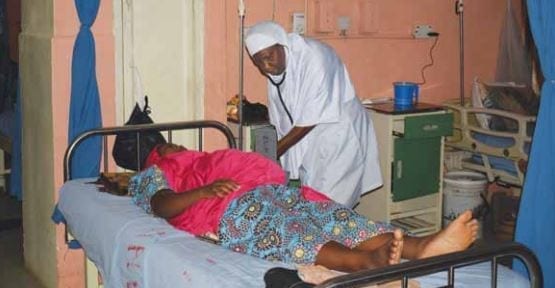
Sep 6, 2018
A new Solidarity Center report, “Working for Peace in North-East Nigeria: A Challenge for Nigerian Trade Unions,” outlines the devastating toll of Boko Haram violence on people living in northeast Nigeria, in particular on civil servants and their families, and how the labor movement will be essential to responding to the aftermath of the crisis and rebuilding for sustainable development and peace.
The report, with accompanying worker testimonials, was launched Tuesday at a 50-person event in Abuja, Nigeria’s capital. featuring three workers victimized by Boko Haram; Solidarity Center, Borno-based trade union partners; representatives of Nigeria’s National Labor Congress (NLC)—including President Ayuba Wabba; Public Services International (PSI); the Trade Union Congress (TUC); the Organization of Trade Unions of West Africa (OTUWA), as well as the press.
“We have lost more than two thousand workers—teachers, local government workers, health workers,” said Wabba, who pointed to lack of good governance as the root cause of conflict.
“We must work assiduously to try to address issues of human and trade union rights,” he continued.
Three years of sustained work by NLC-affiliated public-sector unions in the region preceded the report’s publication. The unions that represent teachers and hospital workers, among groups specifically targeted by Boko Haram militants, were able to document and begin to address the economic and psycho-social impacts of violence on their members and the community at large. “As integral members of their communities,” the report states, “union members are well-positioned to assess the local situation, understand the needs of community members and communicate this essential information to better facilitate the post-conflict rebuilding process.”
Report recommendations include that the government of Nigeria follow principles established by ILO Recommendation 205 to work in coalition with trade unions and employers in creating long-term solutions for a sustainable and inclusive economy, including bringing back family-sustaining jobs and helping institutions such as schools and hospitals recover and rebuild.
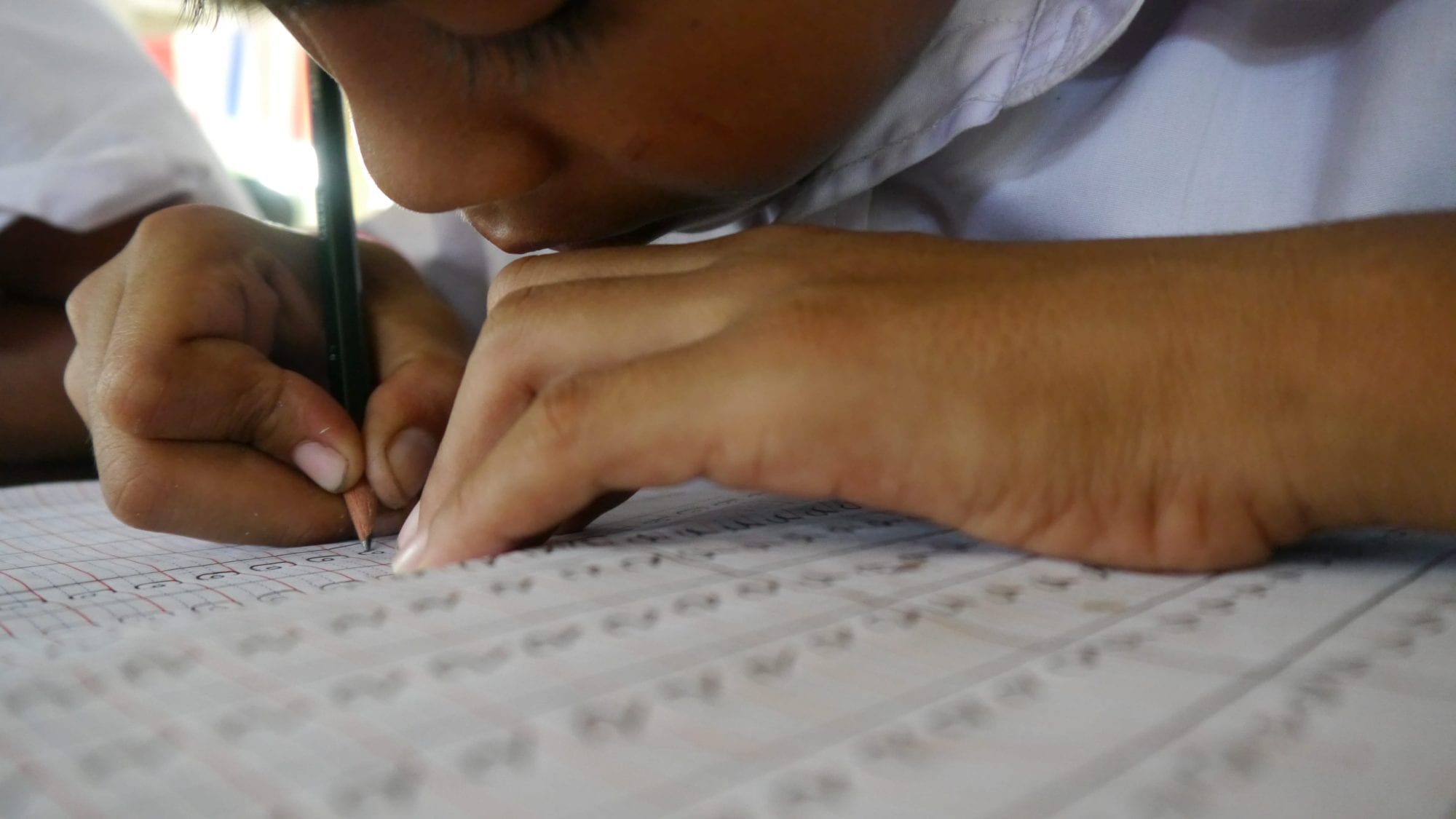
Aug 23, 2018
Two female migrant workers from Myanmar were arrested in Thailand, fined and await deportation for volunteering their time to teach children of migrant workers at a Buddhist monastery, an action the Thailand-based Human Rights and Development Foundation (HRDF) is calling “illegitimate and unjustified.”
The two women, who hold valid passports, visas and work permits, volunteered at the Laem Nok Monastery in southern Thailand in addition to the jobs for which they were hired. But immigration officials charged them with performing work without a permit to teach, even though the time they spend instructing the children is unpaid, according to HRDF and the Migrant Working Group (MWG). The MWG is a network of non-governmental organizations working on health, education and migrant workers’ rights that includes the Solidarity Center.
The arrests occurred despite the statement of one worker’s employer who told police the worker is lawfully employed and has been excused to take leave from her regular job painting boats because she is pregnant. The monastery also affirmed the two workers taught without pay, actions that are not illegal in Thailand, says HRDF, a Solidarity Center partner.
The women were forced to sign a document in Thai that they did not understand, in which they admitted they committed a crime, and received a fine of 5,000 Baht ($153) in lieu of imprisonment. They will be banned from re-entering to work in Thailand for two years, according to HRDF. A Myanmar national holding a tourist visa who observed the volunteers teaching was also arrested on the same charge.
“The arrests could signal a strong discouragement to other similar teaching programs in the country and could also pose a negative impact on education opportunities for migrant children as a whole,” HRDF and MWG said in a statement.
Volunteers Taught Children at Risk of Exploitation
The Laem Nok Monastery has operated a learning center for children of migrant workers for more than four years. The program began after the community recognized that migrant children, who are often left without care when their parents are working can be targets of forced labor, human trafficking and other forms of exploitation. With support from community fundraising, the monastery dedicated a learning space where children are taught the languages and cultures of Thailand as well as those of their origin countries. Local businesses provide funding for food and teaching supplies, but the teachers are unpaid volunteers, including local college students.
HRDF and MWG are calling on Thailand’s Department of Employment, Ministry of Labor to establish clear guidelines for enforcing compliance with work permits and to review the policy that restricts migrant workers from becoming paid or unpaid volunteers.
The groups also are urging police to ensure migrant workers’ legal rights are respected, including the right to legal counsel and to bail during pre-trial.
“The arrests have created undeserving traumas to the children in the classroom who had to witness their teachers being arrested and taken away in front of them,” says HRDF.

Aug 20, 2018
From the ancient temple complex of Angkor Wat to the palaces and pagodas of Phnom Penh, Cambodia draws vast numbers of tourists from around the world—more than 5.6 million in 2017—who help make the country the sixth fastest-growing economy in the world, with travel and tourism contributing 14 percent of total GDP in 2017.
But even as tourist visits accelerate and the economy booms, the hotel receptionists, room cleaners and maintenance staff essential to this economic growth are struggling to get their fair share of economic prosperity.
At the five-star Sofitel in Phnom Penh, where a room can cost up to $800 a night, base wages are $70 a month plus a percentage of the guest service charge, for a monthly salary of roughly $200 a month. Yet a basic living wage in Cambodia for one person is between $156 a month and $259 a month, and most workers have families to support.
“I want the employer to give a better base wage for employees,” says Phat Saroun, president of a newly formed union at the hotel. “I want to increase the base wage to $85 a month,” he says, speaking through a translator. Phat’s union is part of the Sofitel Phnom Penh Phokeetra Hotel Independent Solidarity Union (SPPHISU).
Phat and five other Cambodian hotel workers traveled to Washington, D.C., in recent days as part of a Solidarity Center delegation to meet and strategize with hotel union activists and other leaders in the U.S. union movement.
A Union Makes a Big Difference

Tourists to Angkor Wat can pay high prices for hotels, even as workers barely earn a living wage. Credit: Wikipedia
With no legal minimum wage in Cambodia’s service sector, the nearly 1.2 million jobs in travel and tourism offer low pay and precarious employment—unless workers succeed in forming a union.
“There are two Sofitels in Cambodia and at the one in Siem Reap, they have a collective bargaining agreement. At my hotel in Phnom Penh, working conditions are very different,” says Phat, who is working to achieve a single contract with both hotels.
In Siem Reap, where nearby Angkor Wat is Cambodia’s biggest tourist draw, Mao Vanda has been part of her 235-member hotel union since its formation 12 years ago. Now a union secretary and shop steward, Mao describes the many improvements workers have negotiated at the luxury Raffles Grand Hotel.
“Working conditions are better than before,” she says, speaking through a translator. “Monthly salaries now average between $160 and $170 in the off-peak season, and around $350 during the five busiest tourist months.
“For instance, before we had a collective bargaining agreement, women were paid only 50 percent of their base salary during the [legally mandated] 90-day maternity leave. After the collective bargaining agreement, women are paid their full salary and full guest service charge for 100 days after giving birth. If they require a surgeon, the employer gives them $500.”
Workers Fear Losing Their Jobs if They Form a Union
Yet despite the significant improvements in wages, benefits and working conditions for unionized hotel workers, challenges to forming unions means union only represent between 4,000 hotel workers and 5,000, says Nimol Vorng, Solidarity Center program officer in Cambodia.
Hotels frequently hire workers on five-to-six month contracts and as a result, “Workers are afraid to join a union because after the contract is finished, the employer won’t hire you any more,” he says.
Although workers in the travel and tourism sector account for 13.6 percent of total employment, “unions don’t have strong voice or the power to negotiate with employer,” he says.
Yet Phat, Mao and other workplace-level union leaders who met with U.S. union activists are striving to strengthen their unions at the workplace and throughout the country’s hotel industry, and they plan to take back to their unions the lessons and experiences they gleaned in the United States.
For Mao, that means planning big. “For every hotel, we want to have a standard [national] minimum wage,” she says.
Solidarity Center Exchange Programs are funded by a grant from the U.S. Department of State, Bureau of Educational and Cultural Affairs.
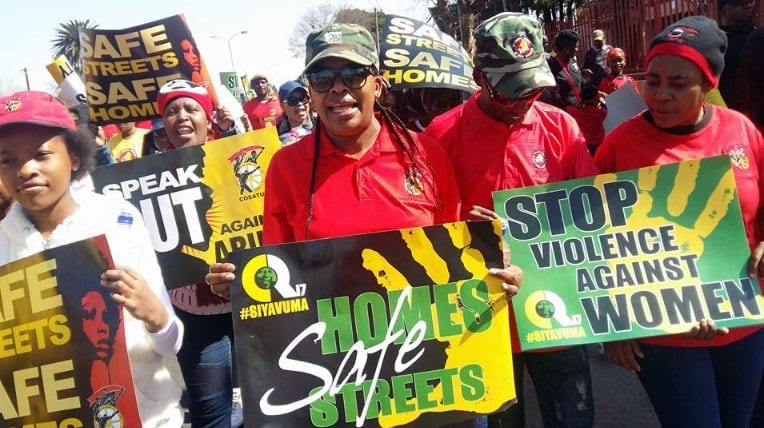
Aug 14, 2018
Gertrude Mtsweni and Rose Omamo, trade union leaders from Africa, recently joined hundreds of workers who participated with government and employer representatives in high-level deliberations on a draft global standard addressing gender-based violence at work.
Energized after long days of intense discussions during the International Labor Organization (ILO) conference in Geneva, the women are now working nonstop at the local and regional levels to educate union members about the draft convention and campaign to push their governments to ratify it after passage.
“All sectors—including clothing and textiles, food and service, transport—are involved in the campaign to end gender-based violence at work,” says Mtsweni, gender coordinator for the Congress of South African Trade Unions (COSATU). Mtsweni is spearheading 16 days of action beginning November 25 in which workers from 16 sectors represented by the federation develop messages highlighting aspects of gender-based violence at work. November 25 is International Day for the Elimination of Violence against Women.
COSATU was among unions joining the thousands of women and their allies who marched across South Africa August 1 to protest gender-based violence as part of the #TotalShutdown campaign. As a result, South Africa President Cyril Ramaphosa acknowledged that “South Africa has failed its women and their constitutional rights” and announced a national summit to address violence against children and women.
Moving Governments to Ratify the Convention
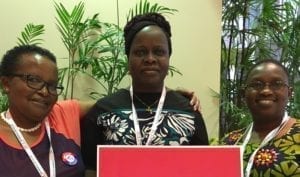
“Government should stand firm to say “No” to violence and harassment in the world of work”—Rose Omamo Credit: Solidarity Center/Tula Connell
In Kenya, Omamo is traveling around the country to educate engineers and workers in glass, metal and petroleum about the draft convention. Omamo is general secretary of the 11,000-member Amalgamated Union of Kenya Metal Workers, national chair of the Congress of Trade Unions–Kenya (COTU-K) Women’s Committee, and COTU-K executive board member.
She says workers are especially pleased that the draft convention, “Ending Violence and Harassment in the World of Work,” covers many groups, including women, men and young workers.
“Because violence in the workplace is rampant, they are saying this will help us have a firm stand to push government against violence at workplace, at home and in society.”
Omamo and Mtsweni also are working with the gender commission of the Organization of African Trade Union Unity (OATUU) to develop an effective message to urge their governments to ratify the convention after it is passed by the United Nations. Countries are not covered by a UN convention unless their governments ratify it and indicate they are committed to applying its provisions in national law and practice, and reporting on its application at regular intervals.
“One strong message we are putting across is that the government should stand firm to say “No” to violence and harassment in the world of work, and workers must be protected wherever they are,” says Omamo. The dozens of OATUU union affiliates are based in countries such as Angola, Burkina Faso, Ghana, Guinea, Rwanda, Tanzania and Togo, in addition to Kenya and South Africa.
Unions’ Campaign for Convention on Gender-Based Violence at Work

The Solidarity Center produced a video as part of its campaign for passage of a gender-based violence at work convention.
Momentum for an ILO convention covering gender-based violence at work follows years of advocacy by the global union movement, an effort led by the International Trade Union Confederation (ITUC).
Leading up to the most recent negotiations, Solidarity Center partners urged their unions, governments and employers to publicly support a binding ILO convention on violence and harassment at work that includes gender-based violence.
With Solidarity Center support, more than a dozen workers—from Brazil, Cambodia, Gambia, Guatemala, Honduras, Indonesia, Kenya, Mexico, Morocco, Nigeria, Palestine, South Africa, Swaziland, Tunisia and Zimbabwe—participated in the ILO conference. Several took lead roles in the negotiations as part of the workers’ group, including Omamo, who ensured gender-based violence remained the focus of discussions.
“The workers were very strong in negotiations, very specific on what they want,” says Omamo. “They took a very firm stand on the areas they felt that were good for workers.”
Elsewhere, union members from Ghana, Liberia, Sierra Leone and Turkey joined their sisters from across Nigeria in a weeklong training on the ILO draft convention, sponsored by the National Women Commission’s of the Nigerian Labor Congress (NLC).
And in Honduras, Solidarity Center staff organized a meeting of representatives from unions, government and business to garner support for a global standard inclusive of gender-based violence and to advocate for a law on sexual harassment at work.
The ILO in recent days released an updated version of the draft convention that reflects the discussions this spring, and will hold follow-up meetings throughout the fall. The organization will issue a second questionnaire for unions, governments and business to solicit further input on the convention (the results of the first questionnaire were incorporated in a draft last spring), and final discussion will take place at the next full ILO conference next May.
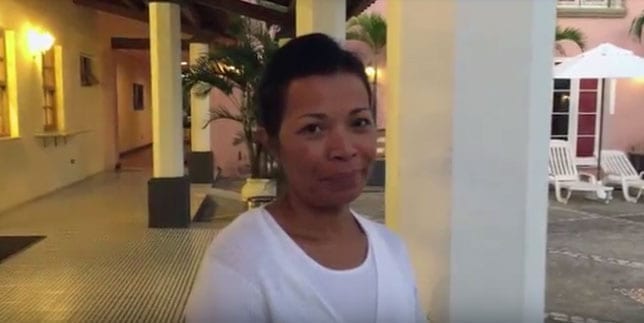
Aug 9, 2018
I am Marie Constant, I am from Madagascar. I have worked as a domestic worker in Lebanon since 1997. I work for one person only. The work is difficult, especially when we receive guests as we don’t have choice but stay up late working until the guests leave which is usually around midnight or sometimes around 1 a.m.
In general, the domestic workers don’t have a choice as they need to work from morning until evening with no specific break time and no holidays. And because of these rights abuse, we decided to form a union to defend our rights. Also, the fact that most domestic workers don’t have the right to weekly leave, we try to reach out to all the domestic workers women in most of the regions to educate them about their rights.








